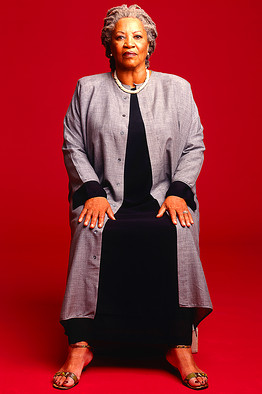With the dissolution of Borders Bookstore, my personal library has expanded by more than a dozen books. A melancholy enterprise, buying those books. I don’t like to think of myself as an anonymous member of a swarm, but there I was, there we all were, picking clean the stacks, like flies on a carcass (Perish the thought that the image from this month’s mystery passage be more apt.)
How badly did I need those books? As it turns out, they were all quite necessary. A careful scan around the house revealed to me a pressing issue: The double-stacked shelves with thinner books jammed horizontally on top of the vertical books looked good, but – how could I have missed it – a couple of corners were still somehow naked of books. Okay, full disclosure: One of those corners did have a small pile, but rising to an insufficient height. I like my books-in-corners to create a kind of faux wainscoting. This had to be solved, and the Borders liquidation sale was just the ticket. Because of Borders’s gross mismanagement, I now have William Trevor’s Selected Stories, Carlos Fuentes’s Destiny and Desire, and the new Pevear and Volokhonsky translation of Doctor Zhivago working well as three of the heavy lifters, providing a base for some of the smaller books, such as A. S. Byatt’s The Children’s Book, an Everyman edition of Blood Meridian, a couple of Mario Vargas Llosa novels and some Susan Sontag. Plus, thanks to Sam’s efforts, we have added a new peninsula to our cookbook collection. At Elizabeth David’s Table: Classic Recipes and Timeless Kitchen Wisdom and the new Culinaria China are the two stars of this feature. There is still room for expansion, but the effect is satisfying.
Will I actually read all these new books and try all the new recipes? Taking into account my current backlog, adding to that all the books I don’t even know about yet, and assuming medical science can raise the average human life expectancy to about four hundred, I might just make it under the wire. Death cannot be interrupted, Jose Saramago’s fantasy notwithstanding, but we in America can always use rampant acquisition to bolster our illusions.
Among my purchases was a new translation of a famous novel, a book I read years ago and loved. It is always disconcerting how much a novel fades from memory over time, even one greatly enjoyed. But there is one scene from this particular novel that has remained with me, and probably always will. I’ll give you its more salient moments. See what you can make of it:
I turned away from the Swede as the docker rose with some effort. “Well now, let’s just take a little look and see what we got.” This he said to Matzerath, who had no idea what he was talking about but still concurred. Steadily repeating “let’s just take” and “a little look,” the docker kept hauling on the line, but with more effort now, then climbed down the stones alongside the line and thrust — Mama didn’t turn away in time — thrust his whole arm into the blubbering bay between the granite stones, felt around, got hold of something, grabbed tight, pulled, and crying out to us to stand back, swung something upward, something heavy and dripping, a spraying, living clump, into our midst: a horse’s head, a fresh head, a real one, the head of a black horse with a black mane, which only yesterday or the day before may still have been whinnying, for the head was not yet rotten, did not stink, smelled at most of the Mottlau, like everything else on the jetty.
The man with the docker’s cap, which was now pushed far back on his head, was standing over the horseflesh, from which small light green eels were furiously wriggling. The man had a hard time catching them, for eels move quickly and surely over smooth stone, especially when it’s damp. Seagulls and the screech of seagulls were instantly above us. They pecked away, three or four of them easily handling a small to medium-sized eel, nor could they be driven off, for the jetty was their domain. Nevertheless the docker, thrusting his arm forcefully among the gulls and grabbing hold, managed to stuff perhaps two dozen smaller eels into his sack, which Matzerath, helpful as ever, held out for him. He was too busy to see Mama’s face turn the the color of cheese, as she laid first her hand and then her head on Jan’s shoulder and velvet collar.
……..
Nor did they listen to Oskar, who weighed in against the gulls with his drum and battled their whiteness with a whirl of his sticks on white lacquer. But that didn’t help, at most turned the gulls even whiter. Matzerath, however was not worried in the least about Mama. He laughed and mimicked the docker, showed how strong his nerves were, and when the docker was practically done and with a final flourish pulled a huge eel out through the horse’s ear, causing the white gruel of the horse’s brain to dribble out with it, Matzerath’s face too turned the color of cheese, but he still couldn’t stop showing off, bought two medium-sized and two large eels from the docker for practically nothing, then tried to talk him down even further.
The game is simple: 1. Guess the author. 2. Guess the book.
As before, your speculations and imaginings are far more interesting than a mere correct answer. If you’ve read the book from which comes this slimy scene, please share any thoughts you might have about it or (here’s a clue) its somewhat controversial author.



